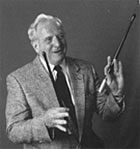 Percussion industry icon William F Ludwig II died in Chicago of natural causes on March 22, 2008, at the age of 91. His health had steadily declined for several years in the wake of major surgery for an aneurism and several strokes. Ludwig’s wife Marguerite predeceased him in 2002.
Percussion industry icon William F Ludwig II died in Chicago of natural causes on March 22, 2008, at the age of 91. His health had steadily declined for several years in the wake of major surgery for an aneurism and several strokes. Ludwig’s wife Marguerite predeceased him in 2002.© Drummerszone.com 2002-2026 Drummerszone.com is a Musicpublishers.nl website.
Oops, you're not logged in!
The more you like
the more you get!
